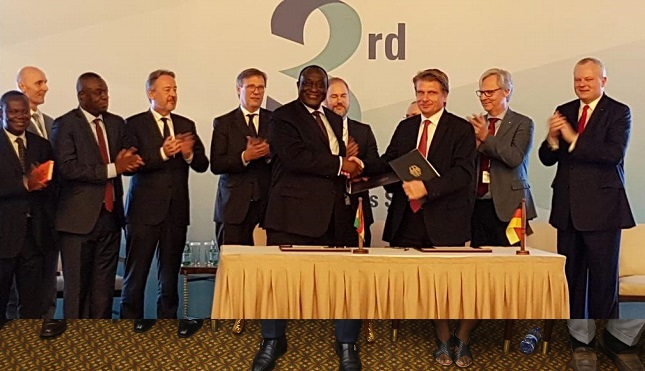Alan Kyerematen and Thomas Bareib shake hands after signing the MoU while other officials from Ghana and Germany applaud
Ghana and the Federal Republic of Germany on Tuesday signed a Memorandum of Understanding (MoU) to establish the German-Ghanaian Business Council.
Senior government officials and business executives from the two countries took part in the signing ceremony.
Minister of Trade and Industry, Alan Kyerematen initialed the documents on behalf of Ghana while Thomas Bareib, a Minister of Economy Affairs and Energy, Federal Republic of Germany, signed on behalf of his country.
The signing ceremony took place on the sidelines of the 3rd German–African Business Summit at the Kempinski Gold Coast City Hotel in Accra.
According to Mr Kyerematen, the establishment of the German Ghanaian Business Council would facilitate the exchange of information and views on economic cooperation, trade and investment and also promote industrial cooperation for Small and Medium-scale Enterprises (SMEs).
Additionally, he said the council would work on matters of mutual interest in respect of multilateral trade negotiations between the two countries.
The German-Ghanaian Business Council has been established to facilitate economic cooperation and promote bilateral trade and investment between the two countries.
The Minister revealed that the role of the Council would, among others, discover business opportunities, especially trade and investment related activities that could be taken advantage of by both countries for the enhancement of bilateral economic, trade and investment cooperation.
He expressed the belief that SMEs in Ghana would imitate the core competences of the German SMEs and leverage the research and innovation of German businesses through strategic partnerships.
Mr Kyerematen was also a panelist in a high level discussion on how Africa could transform the 21st Century to its advantage.
According to him, the German Ghanaian Business Council would deliberate on specific trade and investment matters of mutual interest.
It would determine specific constraints to mutual trade, investments and economic cooperation and how best to address such constraints.


